On Wednesday, 14 May 2025, EUPAVE held its 10th Workshop on Best Practices in Concrete Paving at its offices in Brussels and online. This hybrid event focused on “Dowels and tie-bars in concrete pavements” and brought together around 15 participants in person and 50 online attendees.
The workshop explored both theoretical concepts and field experience related to load transfer systems in concrete pavements.
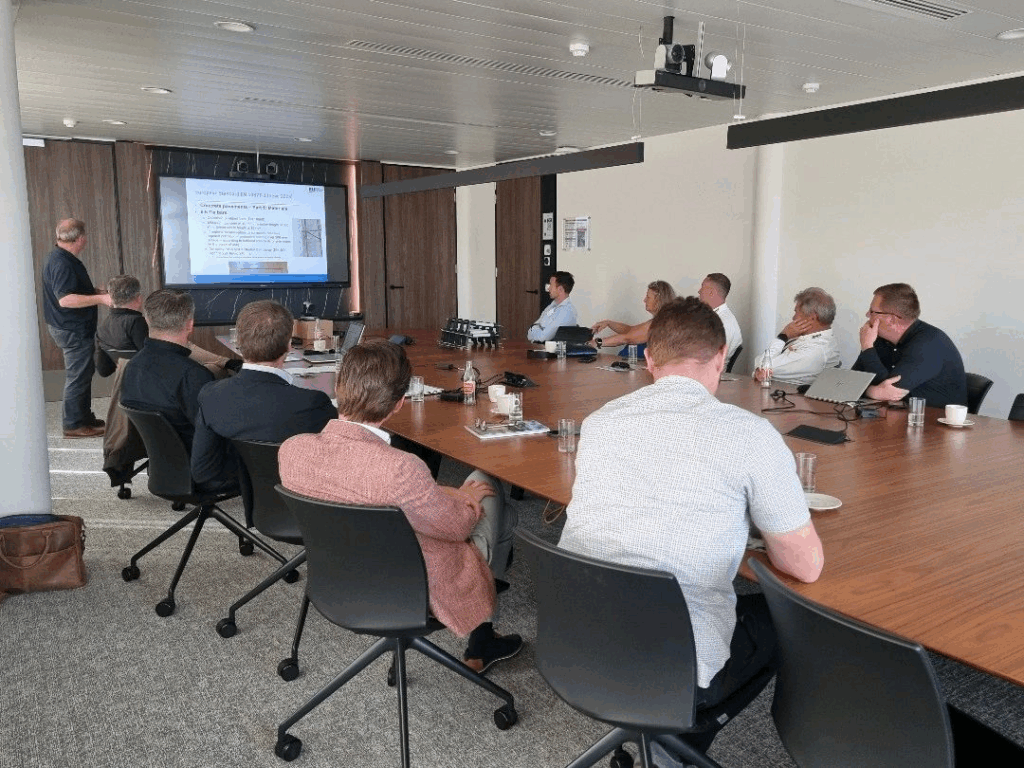
Luc Rens, Technical Director of EUPAVE, opened the event with an introduction to the topic.
The first presentation was given by Dirk Brentzel, CEO of Otto Brentzel. Dirk shared his perspective on “More than 50 years of reliable load transfer solutions in Europe,” highlighting the durability and performance of established dowel technologies.
The second presentation on “Glass fibre reinforced products, are you ready for the future?” was delivered by Tom Roos, CEO of Roos Groep. He introduced innovative materials and discussed their potential to shape the future of pavement reinforcement.
Anne Beeldens, owner of AB-Roads, followed with a talk titled “From design to practice,” bridging the gap between theoretical design principles and real-world implementation.
After a short coffee break Pascal Buys, owner of Robuco, discussed “the techniques of dowel bar retrofitting and cross stitching”. He detailed practical methods for enhancing pavement performance through post-construction interventions.
The final presentation was given by Luc Rens who presented “Standardisation of dowels – where are we now?”, offering a comprehensive overview of current developments and harmonisation efforts at European level.
The event and Q&A session was moderated by Jeroen de Vrieze from Cement&Beton Centrum, Chairman of EUPAVE’s Working Group on Best Practices.
A cocktail reception for in-person attendees concluded the workshop.
EUPAVE thanks all the speakers for their valuable contributions, as well as all participants for their interest and active engagement throughout the event.
More information on FRP dowels

Recently, the American Concrete Institute Center for NonMetallic Materials (ACI-NEx) published a new report on the use of “FRP dowels in concrete pavements” – including all aspects: materials, design, construction and performance (in the U.S.). It also includes references from Europe (Belgium) and Québec (see Appendix A). The document is available for free through the following link; you will find it in the lower right hand corner : Publications | NEx
On Thursday 20 June, EUPAVE successfully hosted a webinar entitled “The past & future evolution of load transfer systems for jointed concrete pavements”. The online event featured a presentation by Mark Snyder of PERC, LLC. His presentation was originally given during the opening session of the 14th International Symposium on Concrete Roads.
The webinar attracted 74 participants from around the world. This turnout underlines the growing interest and importance of the topic within the industry.
Luc Rens, Director of EUPAVE, opened the event by introducing EUPAVE, its mission and its 42 members and partners. He also said a few words about its 6 working groups and their work. He recalled that the association had recently published its manifesto “Durable and sustainable roads for the next generation”. Luc ended his presentation with an introduction on dowels and load transfer.
Mark Snyder’s presentation looked at the historical context of load transfer systems and explored innovative future developments in the field. A Q&A session concluded the webinar.
As Luc announced in his introduction, this was the first in a series of webinars and workshops on dowels and load transfer.
The full webinar is available below:
On Wednesday, 22 May 2024, EUPAVE held its 9th workshop on Best Practices in Concrete Paving in Brussels. The theme for this year was “Non-destructive auscultation and monitoring techniques for concrete pavements.” Organized as a hybrid event, it attracted 80 online and in-person participants.
The workshop aimed to highlight advanced methods for assessing and maintaining concrete pavements without causing damage. Experts in non-destructive testing (NDT) led a series of insightful sessions, exploring the latest technologies and methodologies that ensure the structural integrity and longevity of concrete surfaces.
Luc Rens, Director of EUPAVE, started the event by presenting EUPAVE’s new Strategic Plan, set to be released in September 2024. He then showcased some innovations in concrete paving and provided a quick recap of previous Best Practices workshops held by EUPAVE.
Jeroen de Vrieze from Cement&BetonCentrum moderated the event and introduced the speakers.
The first talk was given by Dipl.-Ing. Stefan Höller from the Federal Highway Research Institute (BASt), who discussed “Falling weight deflectometer on concrete pavements – current situation and perspective.”
Luc Rens followed with insights on “Smart roads through the use of sensors”.
Mr. Kurt Pappaert, Operational Manager Inspection Drones from Citymesh, shared his expertise on “Enhancing infrastructure monitoring with non-destructive aerial techniques”.
After the break, Mr. Dirk Anke, Senior Software Developer at MIT Mess- und Prüftechnik GmbH, introduced “Dowel detection and thickness measurement“.
The workshop concluded with a recorded session by Ms. Audrey Van der Wielen, Researcher at the Belgian Road Research Centre, on “Ground penetrating radar and ultrasonic tomography”.
The presentations were followed by a Q&A session with both live and online participants. For those attending in person, the afternoon ended with a pleasant networking cocktail.
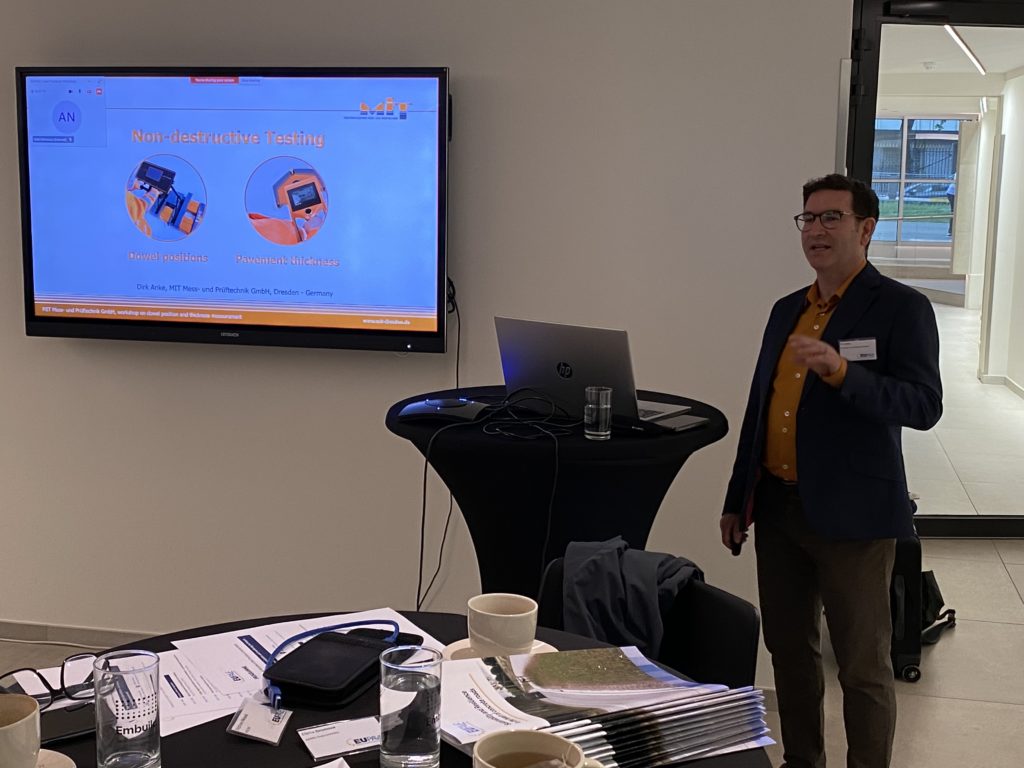
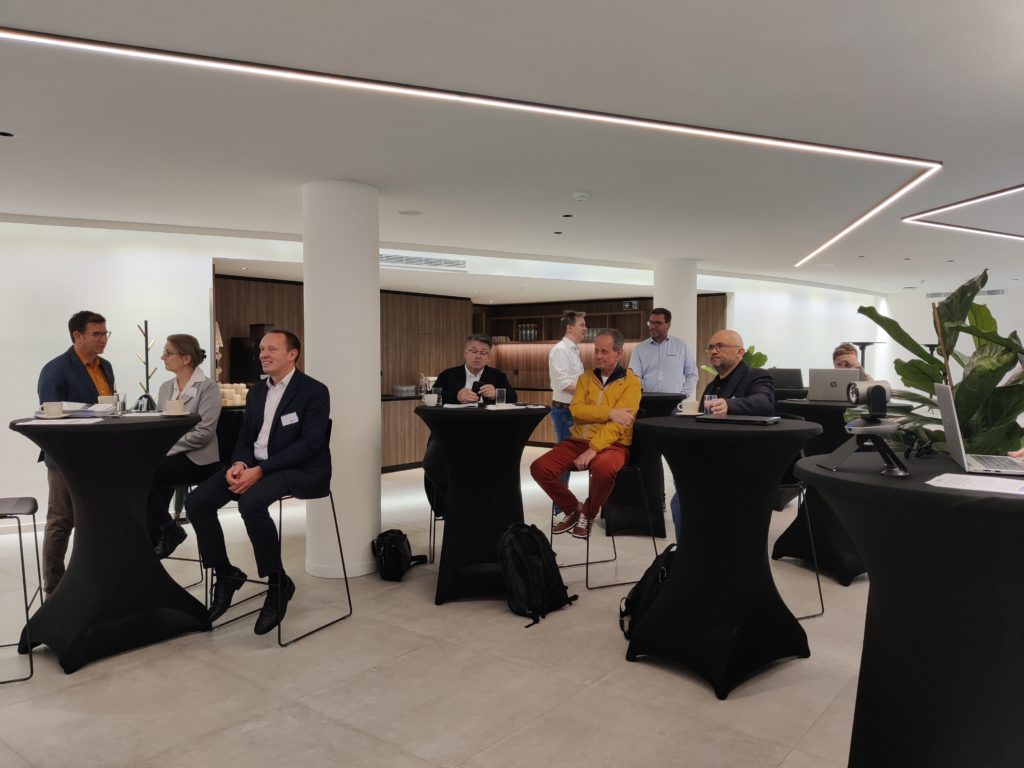
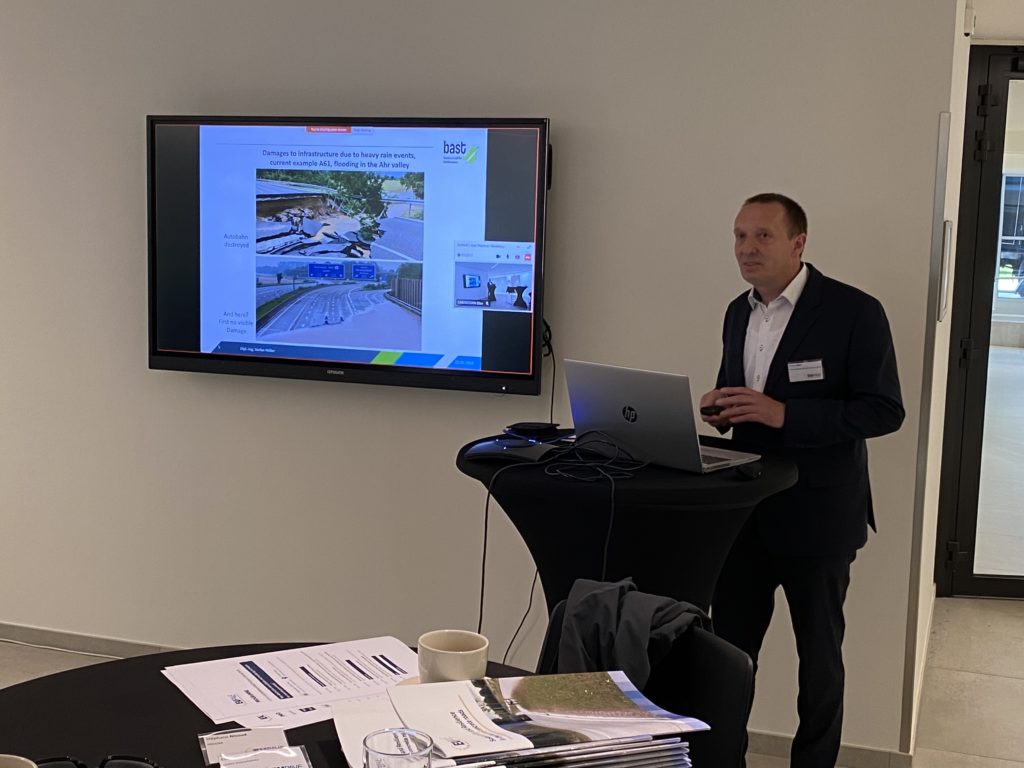
We are glad to announce our next webinar with theme “The past and future of load transfer systems for jointed concrete pavements”. It will be held on Thursday 20 June from 16:00 to 17:00 (Brussels time).
The webinar is the presentation given by Mark Snyder (PERC, LLC) during the Opening Session of the 14th International Symposium on Concrete Roads.
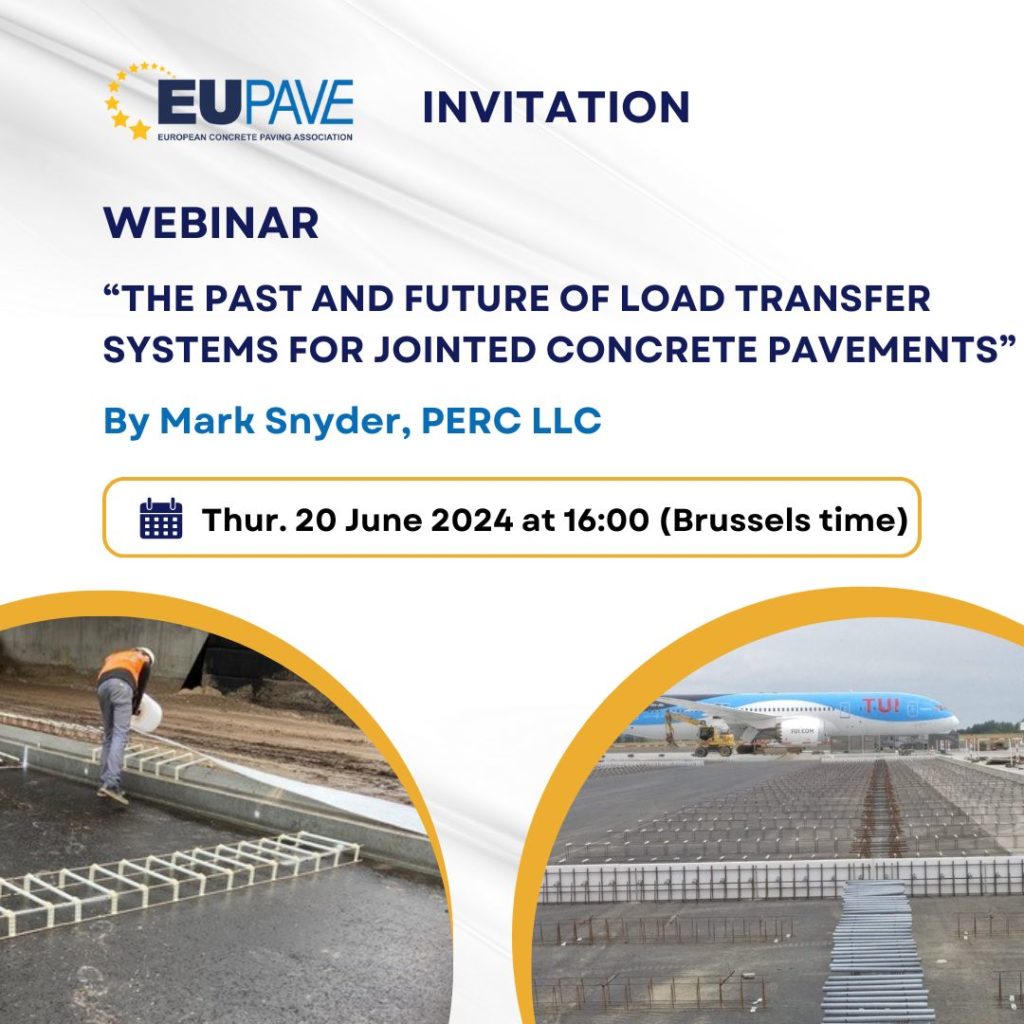
Mark Snyder earned his Bachelor’s, Master’s and Ph.D. degrees at the University of Illinois in Urbana-Champaign, specializing in Structures and Pavement Engineering. Dr. Snyder has more than 35 years of experience in these areas, including 13 years as a professor of Civil Engineering (at Michigan State University and the University of Minnesota) and 10 years with the Minnesota and Pennsylvania Chapters of the American Concrete Pavement Association. He retired in 2024 from his work as the President of Pavement Engineering and Research Consultants (PERC). Mark is the author of the 2006 ACPA engineering bulletin “Recycling Concrete Pavements” and is the lead author of the U.S. National Concrete Pavement Technology Center’s 2018 “RCA Manual of Practice.” He is a registered professional engineer in Illinois, Minnesota, Pennsylvania and Hawaii.

This post has been drafted by Luc Rens, Managing Director of EUPAVE for the blog “Concrete Insights” of Concrete Connect.
Today everyone is aware of the global challenges facing our society. The concept of “sustainable construction” has been at the heart of the construction world for many years, focusing on the three well-known pillars: economy, environment, and society. With the issue of global warming, the debate is now more focused on reducing CO₂ emissions with a roadmap toward complete decarbonisation by 2050.
Sustainability: meeting the needs of the present without compromising the ability of future generations to meet their own needs (UN, 1987)
This certainly applies to the transport sector and therefore also to the road construction sector. Indeed, roads and road transport will continue to play an important role in moving people and goods in the future. For freight transport in particular, a further significant increase is expected in the coming decades and thus also a possible increase in environmental impact. Additional measures will therefore be necessary and decision-makers will have to make thoughtful and considered choices in the design, construction, and management of transport infrastructure.
The choice of the type of road pavement is one such choice, where the aim should be to find the most sustainable solution, taking into account all possible criteria, both in the short and long term. Even if the focus is mainly on measures to combat global warming, other important aspects need to be taken into account and are also high on the European Union’s agenda. These include the circular economy, the resilience of our infrastructure, and sensible water management.
- Circular construction is about saving resources through prevention, reuse, and recycling. Resilient roads must be able to withstand increasing threats of natural and man-made disasters.
- Sustainability and resilience work in tandem, with resilience forming the foundation for all three pillars of sustainability.
- Ecological water management requires an integrated approach throughout the water chain to mitigate both problems of flooding and water shortage during periods of drought.
Resilience: the capacity of social, economic and environmental systems to cope with a hazardous event or trend or disturbance, responding or reorganising in ways that maintain their essential function, identity and structure, while also maintaining the capacity for adaptation, learning , and transformation (IPCC, 2014)
The European Concrete Paving Association, EUPAVE, is convinced that rigid solutions – concrete pavements and hydraulically bound base layers – can contribute to a more sustainable and resilient transportation network. Therefore, EUPAVE’s Sustainability & Resilience Working Group has prepared fact sheets covering the different themes.
The work started with an infographic “Concrete pavements make roads more sustainable”, showing the basic messages in the different domains. Next, the fact sheets were drafted in which each sub-aspect was discussed in more detail, each time based on the latest findings from international practice and research.
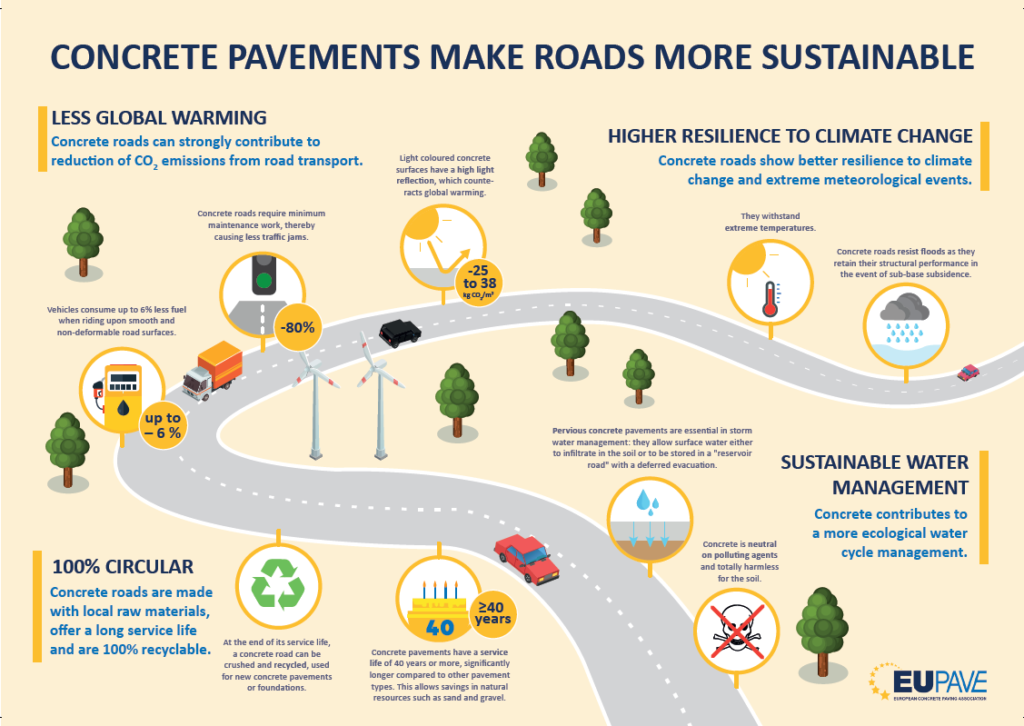
Concrete pavements make roads more sustainable
EUPAVE developed 6 fact sheets:
- Concrete roads can strongly contribute to a reduction of CO₂ emissions from road transport– HIGH ALBEDO.
- Concrete roads can strongly contribute to a reduction of CO₂ emissions from road transport– LESS FUEL CONSUMPTION.
- Concrete roads are made with local raw materials, offer a long service life, and are 100% recyclable – 100% RECYCLING.
- Concrete roads are made with local raw materials, offer a long service life, and are 100% recyclable – LONG SERVICE-LIFE – LOW LIFE-CYCLE IMPACT AND COST – LOW MAINTENANCE, LESS DISRUPTION.
- Concrete roads show better resilience to climate change and extreme meteorological events – HIGHER RESILIENCE.
- Concrete contributes to more ecological water-cycle management – SUSTAINABLE WATER MANAGEMENT.
These fact sheets are gathered in EUPAVE’s compilation of fact sheets.
In conclusion, concrete roads are a key part of creating a greener and resilient transportation system that deals with current challenges and future needs. EUPAVE’s fact sheets are a useful guide, urging decision-makers to think about how their choices affect the economy, environment, and society in the long run.
As the festive season unfolds and we approach the close of another transformative year, the European Concrete Paving Association extends warm wishes to you and your loved ones. We find ourselves reflecting on the remarkable journey we’ve shared throughout the past twelve months and the strides we’ve taken collectively to pave the way for a sustainable and resilient future.

In 2023, EUPAVE remained steadfast in its commitment to advancing the realm of concrete pavements. Our events, such as the Best Practices workshops, the prestigious 14th International Symposium on Concrete Roads, and the engaging EU Debate, served as platforms for knowledge exchange, fostering collaboration among industry leaders, researchers, and practitioners.
These forums, made possible through the unwavering support of our Members and Partners, have played a pivotal role in shaping the discourse around concrete roads and their role in the evolving landscape of transportation infrastructure.
Our dedication to disseminating valuable insights was exemplified by the publication of our compilation of fact sheet (add link). These documents underscore the environmental benefits, resilience, and longevity that concrete pavements bring to road infrastructure, contributing significantly to the overall sustainability agenda.
As we stand at the cusp of a new year, EUPAVE remains committed to pioneering innovations that address the challenges of climate-neutral mobility. Concrete roads, with their inherent sustainability and resilience, are poised to play a pivotal role in this critical endeavor.
The path ahead is one of continued collaboration, innovation, and advocacy as we collectively strive to build a transportation landscape that aligns with our shared environmental aspirations.
On behalf of the EUPAVE Secretariat, we extend our heartfelt gratitude for your unwavering support throughout the past year. Together, let us embark on the journey ahead with renewed determination and a shared vision of a future where concrete pavements pave the way to sustainable, climate-neutral mobility.
Wishing you a joyous holiday season and a prosperous New Year.

Warm regards,
EUPAVE Secretariat
EUPAVE is glad to announce its EU Debate on “Deployment of innovative infrastructure for a climate-neutral mobility”. The event will be held in-person Tuesday 5 December 2023 from 16:30 to 18:00 at Embuild building, Avenue des Arts 20 – 1000 Brussels. It will be followed by a cocktail reception from 18:00 to 19:00.
FREE EVENT
Please register by Tuesday 28 November: https://forms.gle/8H3cNYyy4HtPCi899
Everyone today is aware of the global challenges facing our society. The concept of “sustainable construction” has been at the heart of the construction world for many years, focusing on the three well-known pillars: economy, environment and society. With the issue of global warming, the debate is now more focused on reducing CO2 emissions with a roadmap towards complete decarbonisation by 2050.
EUPAVE is convinced that rigid solutions – concrete pavements and hydraulically bound base layers – can contribute to a more sustainable and resilient transportation network. Therefore, EUPAVE’s Sustainability & Resilience Working Group has prepared 6 fact sheets covering the different themes. The work started with an infographic “Concrete pavements make roads more sustainable”, showing the basic messages
in the different domains. Next, the fact sheets were drafted in which each sub-aspect was discussed in more detail, each time based on the latest findings from international practice and research.
The following factsheets are available in this publication:
- Concrete roads can strongly contribute to reduction of CO₂ emissions from road transport – HIGH ALBEDO.
- Concrete roads can strongly contribute to reduction of CO₂ emissions from road transport – LESS FUEL CONSUMPTION.
- Concrete roads are made with local raw materials, offer a long service life and are 100% recyclable – 100% RECYCLING.
- Concrete roads are made with local raw materials, offer a long service life and are 100% recyclable – LONG SERVICE-LIFE – LOW LIFE-CYCLE IMPACT AND COST – LOW MAINTENANCE, LESS DISRUPTION.
- Concrete roads show better resilience to climate change and extreme meteorological events – HIGHER RESILIENCE.
- Concrete contributes to more ecological water cycle management – SUSTAINABLE WATER MANAGEMENT
The Federation of the Belgian Cement Industry, FEBELCEM, and the European Concrete Paving Association, EUPAVE organised on 7 September 2023 a joint workshop on “Innovative case-studies on concrete paving” at MATEXPO 2023, Kortrijk.
MATEXPO is a biennial international trade fair for building equipment at Kortrijk Xpo. As the third largest trade fair of its type in Europe, it has an established reputation and receives more than 40,000 visitors.
Mr. Luc Rens, Managing Director of EUPAVE opened the workshop with a short introduction.
Then, representatives of four manufacturers of concrete paving machines – POWER CURBERS, GOMACO, WIRTGEN and SOMERO, all members of EUPAVE, introduced their innovations.
The first presentation was given by Juan-Luis Fumadó, International Sales at POWER CURBERS Company, LLC. Mr. Fumadó presented different case studies that POWER CURBERS have been working on. He started with a tsunami retention wall in Japan, the NASA airport at Cape Canaveral (USA), race track kerbs in France and others.
You can find his presentation here.
Mr. Patrick Zanen, Global Director of Business Development at GOMACO introduced the multifunctional concrete finishers, allowing the construction of roads and channels in high slopes. He also showed some new developments, amongst which an electrically driven slipform paver for kerbs.
Mr. Martin Datzert, Product Manager at WIRTGEN GROUP, described the innovative developments by Wirtgen in slipform paving, e.g. the new concrete spreading machines preceding the slipform paver and the advanced steering and control tools for machine operators. Emphasis was placed on the many training and assistance options that are offered.
Mr. Glenn Stobart, Territory Manager at SOMERO Enterprises, Ltd gave a presentation of “3D Concrete Paving for Commercial and Industrial Areas: the Future is Now”. He started his presentation exposing the advantages of concrete pavements such as its strength, life cycle, durability and less maintenance. He then presented the concrete paving applications using laser screeds and explained the functioning of 3D integration. He ended his presentation showing the areas of operation where SOMERO is present: external pavements, pervious concrete, tunnel construction, etc.
You can find his presentation here.
A Q&A followed the presentations.
Participants were invited by Patric Zanen to the exhibition stand of DE BRUYCKER-KEMP to take a look at the GOMACO battery-powered slipform paver.
We wish to thank the 50+ participants for their interest as well as the speakers for their great contribution and also the MATEXPO team for the opportunity of organising this event and their great support.
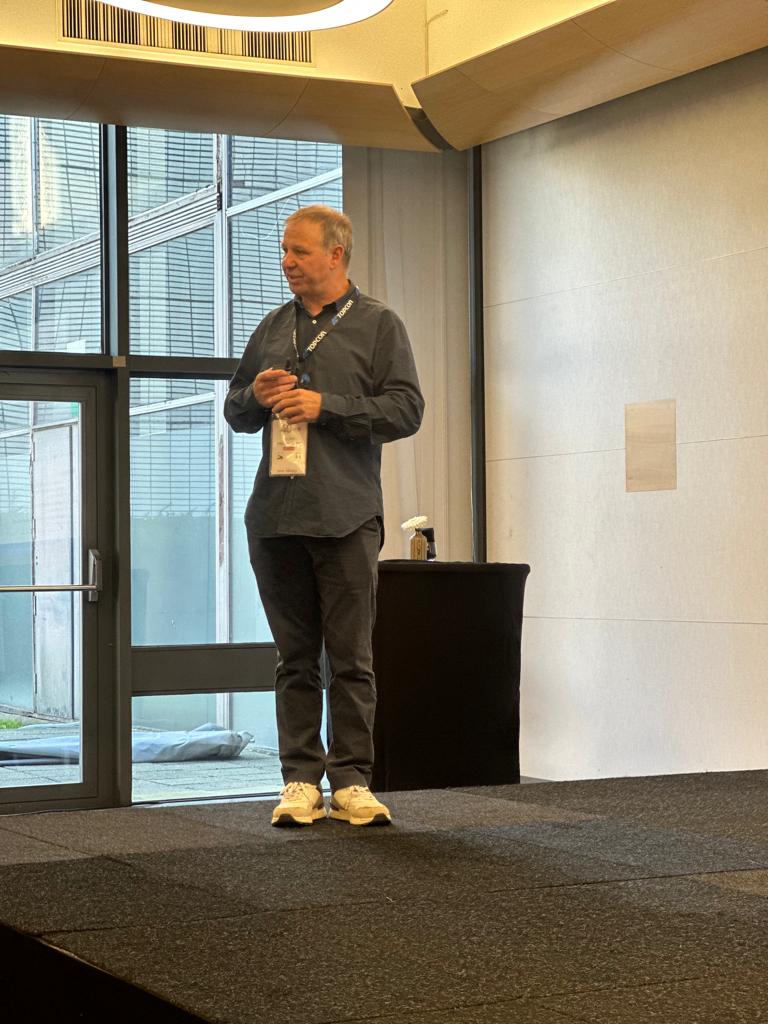
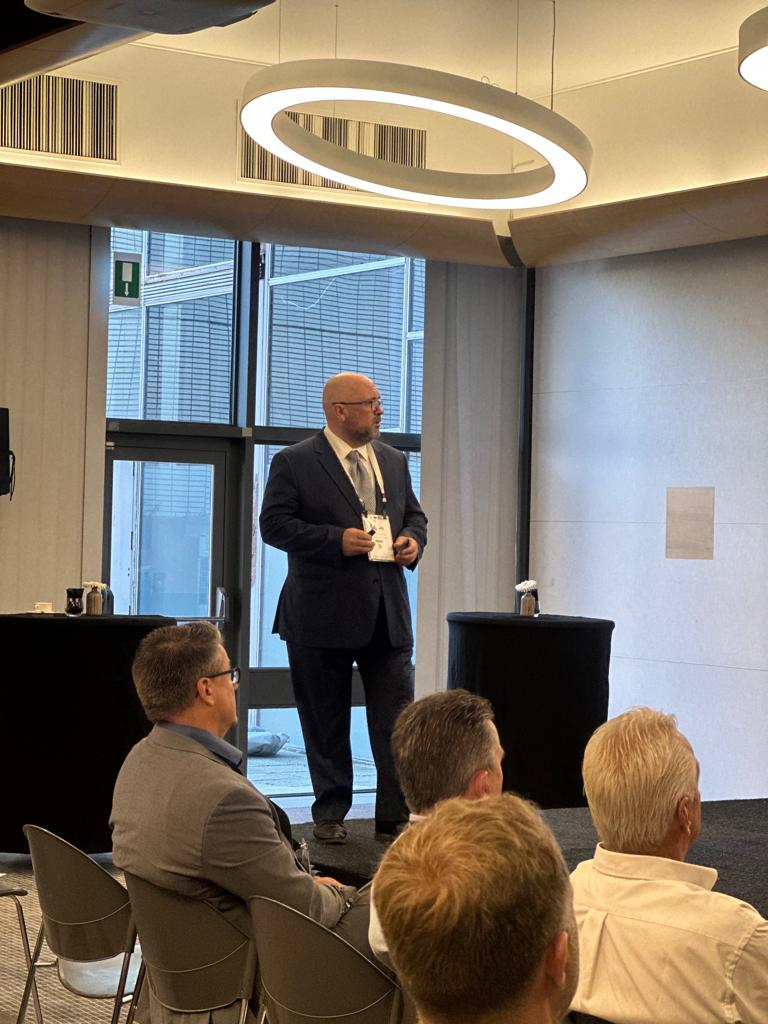
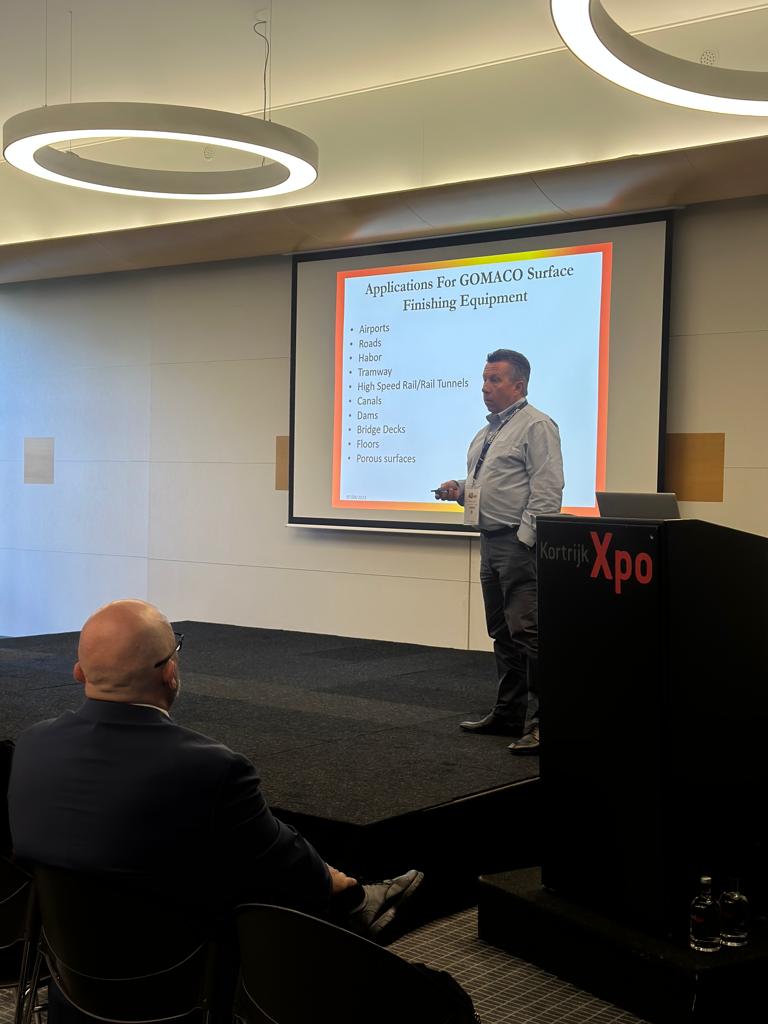
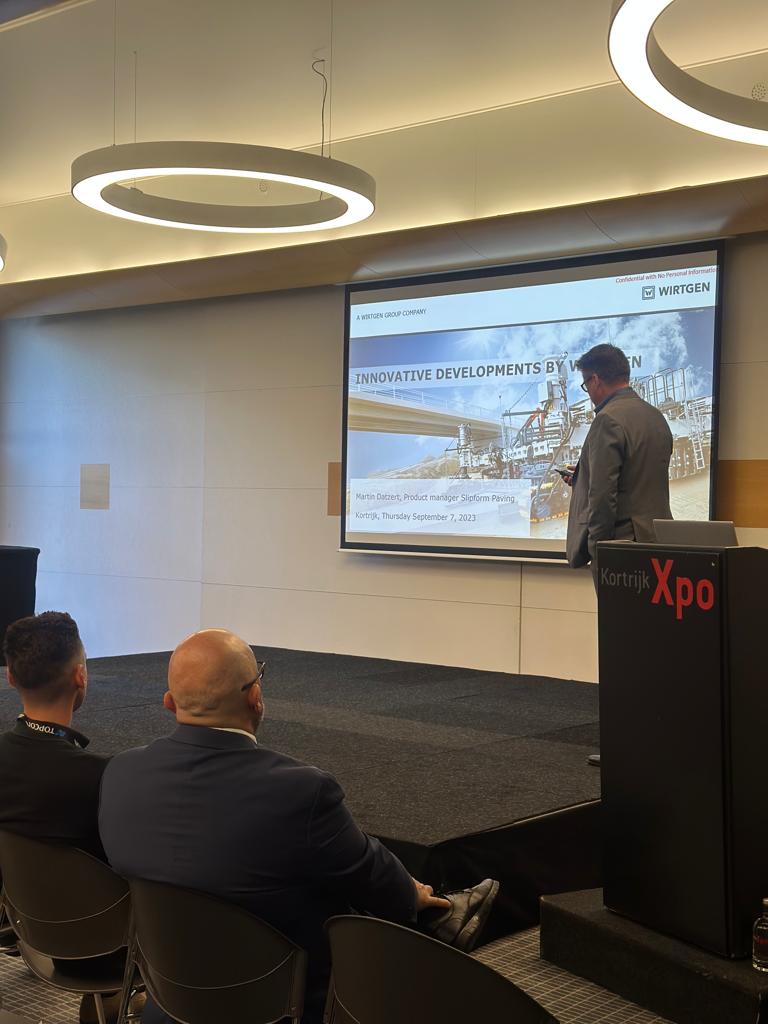
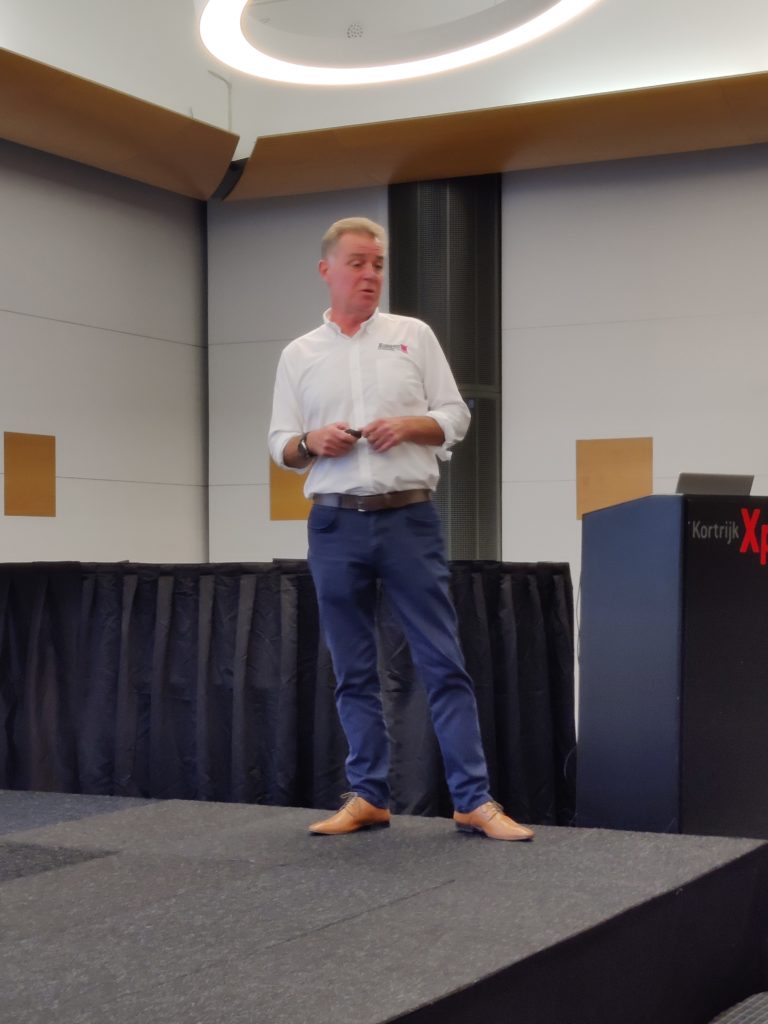
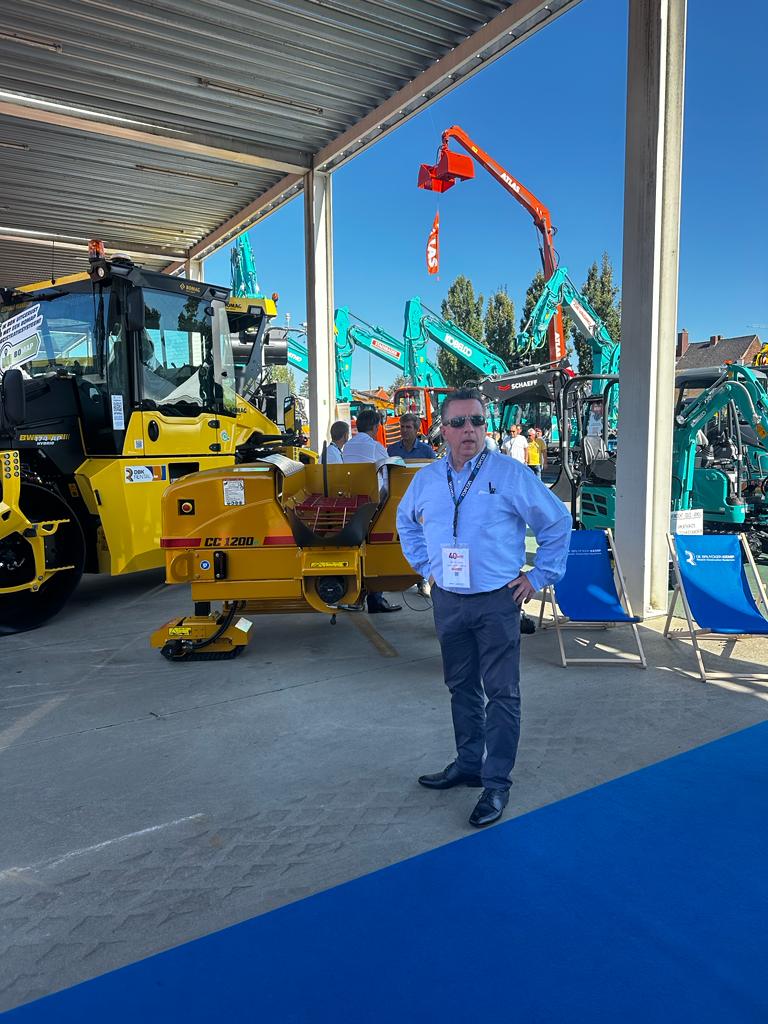
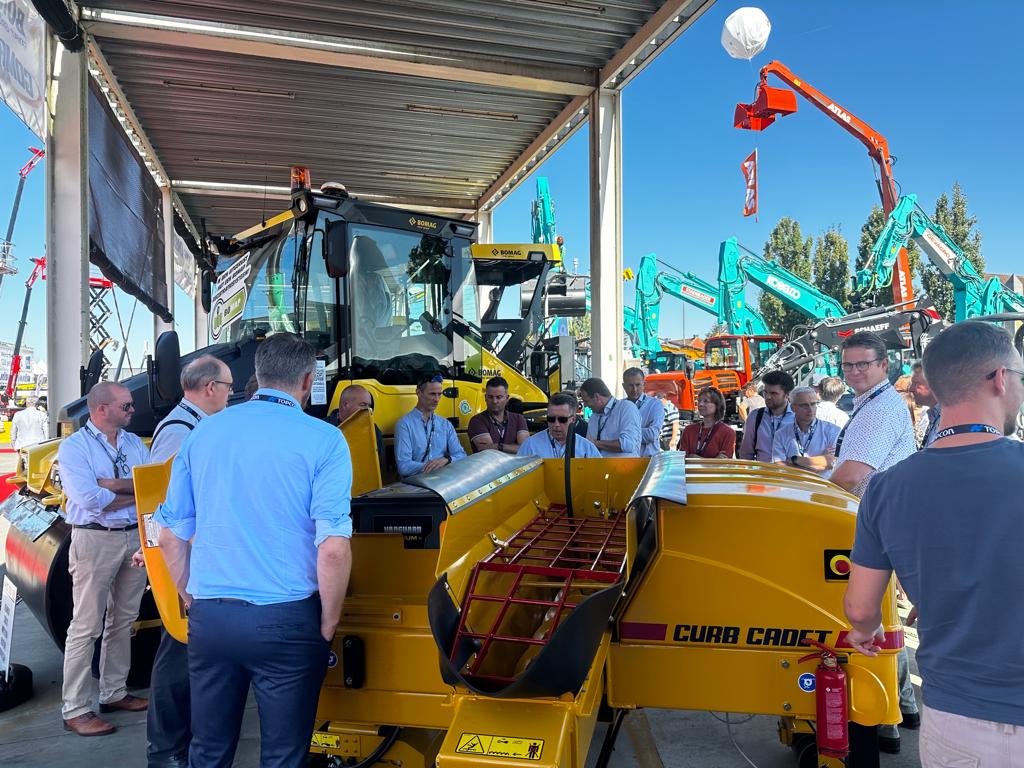
The Annual Report provides an excellent overview of the work and objectives of EUPAVE in 202. We are pleased that we can look back positively on this year and see that our effort have been fruitful.
Five years after Berlin, the 14th International Symposium on Concrete Roads was held from 25 to 28 June 2023 in Krakow, Poland, in the DoubleTree by Hilton Hotel. The organization was in the hands of the Polish Cement Association, together with EUPAVE, under the honorary patronage of the Polish Ministry of Infrastructure and the General Directorate for National Roads and Highways, and with the support of the World Road Association PIARC and the International Society for Concrete Pavements ISCP.

The motto of this edition, “Concrete Roads to the Green World” was present throughout the programme. In addition to the classic technical themes such as design, materials, construction and applications, a lot of attention was paid to sustainability themes like the European Green Deal, circular construction and the economic and social aspects of concrete roads.
Around 220 participants were present to listen to over 70 presentations during the 3-days conference, covering 12 different themes plus a workshop on “Concrete Roads 4.0”.
Opening Ceremony and Gala Dinner
The event started with an enjoyable welcome reception on Sunday evening. Jan Deja, Director of the Polish Cement Association and Luc Rens, Managing Director of EUPAVE kicked off the Symposium.


The Opening Ceremony on Monday morning included welcomes speeches from Jan Deja, Luc Rens, Krzystof Kieres, President of the Polish Cement Association, Stéphane Nicoud, President of EUPAVE, Nazir Alli, President of PIARC, Lucio Salles de Salles, Member of the Executive Committee of ISCP, Zbigniew Kotlarek, President of the Polish Road Congress and representatives of the two main sponsors, OAT and GORAZDZE.

It was followed by an Opening session with contributions from several Polish keynote speakers, sharing the Polish experiences in concrete road construction. Dr. Mark Snyder from the U.S. ended this session with a presentation on “The past and future of load transfer systems for jointed concrete pavements”.
Following a day of sessions, the Polish Cement Association organized the Gala Dinner at the spectacular Wieliczka Salt Mine.

Technical visits
The 2 worksite visits organized Tuesday afternoon were a great success.
One group visited the local concrete roads and bicycle paths in Skawina and the concrete sections in tunnels on S52 in Krakow. Another group went to the section of concrete on A1 Pyrzowice-Czestochowa motorway and visited a test section, where GFRP (glass fiber reinforced polymer) reinforcement bars were used instead of steel for the construction of a CRCP (continuously reinforced concrete pavement) section. The project was executed and presented by Mr. Igor Ruttmar from TAP, STRABAG.
Closing Ceremony
The event came to an end Wednesday 28 June 2023 with the Closing Ceremony.
During the ceremony, Luc Rens introduced the “Carlos Jofré Award” which is dedicated to our colleague Carlos Jofré who passed away on 10 December 2020. It is offered by OFICEMEN, IECA and EUPAVE. It recognizes the whole career of professionals who have a long experience and relevant works in fields related to concrete pavements and cement treated bases. For the first edition, Michael Darter, internationally recognized expert in pavement research and consultant, and participant to all 14 editions of the Symposium, received the trophy. He was also offered financial compensation of 500 EUR for expenses related to the Symposium and an 18-month partnership with EUPAVE.
Rory Keogh, vice-president of EUPAVE, gave the Award of the “Best Technical Paper” to Frederic Otto from Aachen University RWH and his co-authors, M. Oeser, J. Rickwärtz, S. Stevic, J. Kolb, K. Hameyer, M. Niedermeier, R. Grajcarek for their paper “New construction concepts for the realization of electric road systems with dynamic inductive power transfer technologies”.
Stéphane Nicoud, president of EUPAVE, gave the Award of the “Best Marketing Paper” to James Mack (CEMEX USA) and his co-authors, Greg Dean (ACPA) and Leif Wathne (CPTech Center) for their paper “Improving pavement resiliency to flooding: a case for concrete pavements”.



We thank all participants, partners, sponsors, exhibitors, and members of the International Technical Programme Committee for their support and commitment.
For more information, see www.concreteroads2023.com.
On Wednesday 19th April 2023, EUPAVE held in Brussels its 8th workshop on Best Practices in Concrete Paving. The theme for this year was “Outdoor industrial and heavy-duty concrete pavements”. It was organised as a hybrid event, using a professional sound and video-system from the Dutch “Betonhuis” (“Concrete House”). The event was attend by around 60 participants online and in Brussels.
Concrete is extensively used for the construction of internal floors of factories and warehouses as well as for external pavements such as parking, delivery and storage areas and hard standings for heavy use in port and airport areas. When designed and constructed properly, concrete floors and external pavements will provide excellent serviceability over a long period.
Mr. Luc Rens, Managing-Director of EUPAVE, opened the workshop and welcomed the participants. He introduced EUPAVE, its mission and gave an overview of the previous workshops on Best Practices.
He then presented the design and construction of industrial pavements and the comparison with road pavements.
Dr. Anne Beeldens, Consulting engineer and owner of AB-Roads, showed how to build durable heavy-duty pavements.
The third presentation was an “Analysis of critical load arrangements for stacked containers for the design of roller compacted concrete industrial pavements” by Halil Ceylan, Professor at Department of Civil, Construction, and Environmental Engineering at the Iowa State University.
After the coffee break, Myron Hillock, Sales Director at Somero Enterprises, Inc. introduced “Levelling and compaction equipment for industrial floors and pavements”.
Jeroen de Vrieze, Technical Marketing & Statistics at Betonhuis, presented a case study “The Container Exchange Route in Rotterdam: why concrete was chosen”.
Presentation (not yet available)
The presentations were followed by a Q&A from both the live audience and the on-line participants. For the in-person participants, the afternoon ended with a pleasant networking cocktail.
The recording is available on our YouTube channel: https://youtu.be/8QA7vqWE1JY?si=Ot5ocnYPmt7xk1gp
We would like to thank:
- All speakers for their efforts in preparing the presentations and the willingness to share their knowledge and experience
- All participants, live or online, for showing your interest in EUPAVE and the concrete pavement technology
- All our Members & Partners for the support to our association
- And a special thanks to our colleague Jeroen de Vrieze and the Dutch Betonhuis for the use of the audio-visual system.
Wednesday 19 April 2023 from 13.00 till 17.00
EUPAVE Offices (Boulevard du Souverain 68 – 1170 Brussels) and online
Concrete is extensively used for the construction of internal floors of factories and warehouses as well as for external pavements such as parking, delivery and storage areas and hardstandings for heavy use in port and airport areas. When designed and constructed properly, concrete floors and external pavements will provide excellent serviceability over a long period.
This workshop will focus on different technical aspects of outdoor industrial and heavy duty concrete pavements: design, construction, concrete mix characteristics, equipment, etc. but it will also highlight why concrete pavements are often the best choice.
Free participation for all
PROGRAMME
13.00 – 13.45
Welcome coffee and registration
13.45 – 13.55
Word of welcome and introduction to the workshop
Luc Rens, Managing Director, EUPAVE
13.55 – 14.25
Design and construction of industrial pavements – the comparison with road pavements
Luc Rens, Managing Director, EUPAVE
14.25 – 14.55
How to buil durable heavy-duty pavements?
Dr. Anne Beeldens, Consulting engineer and owner of AB-Roads
14.55 – 15.25
Analysis of critical load arrangements for stacked containers for the design of roller compacted concrete industrial pavements
Halil Ceylan, Professor, Department of Civil, Construction, and Environmental Engineering, Iowa State University
15.25 – 15.45
Coffee break
15.45 – 16.15
Levelling and compaction equipment for industrial floors and pavements
Myron Hillock, Sales Director, Somero Enterprises, Inc.
16.15 – 16.45
The Container Exchange Route in Rotterdam: why concrete was chosen
Jeroen de Vrieze, Technical Marketing & Statistics, Betonhuis
16.45 – 17.00
Q&A
17.00
Closing reception
On Thursday 9 March 2023 EUPAVE held a technical webinar titled “Optimal compaction for a durable concrete surface”, attended by 60 global participants.
Mr. Luc Rens, Managing Director of EUPAVE, opened the event by welcoming the participants and presenting EUPAVE and its activities. Luc also gave a short introduction on optimal compaction before introducing the three speakers.
Mr. Paul Jaworksi from Minnich Manufacturing started the webinar with a presentation on “Applied Vibration against Concrete Mechanical Resistance and its Impact on Carbon Neutrality”.
He was followed by Dr. Michael Ayers, President of Global Pavement Consultants, Inc who showed cases of problems and how to remediate.
Mr. Rory Keogh, recently retired as Managing Director of Gomaco International and newly consultant, explained how monitoring and controlling of compaction by a slipform paver can be done in practice. The tile of presentation: “Slipform Paving with Auto-Vibe”.
The presentations were followed by a Q&A session.
You can find the recording of the webinar on our Youtube channel
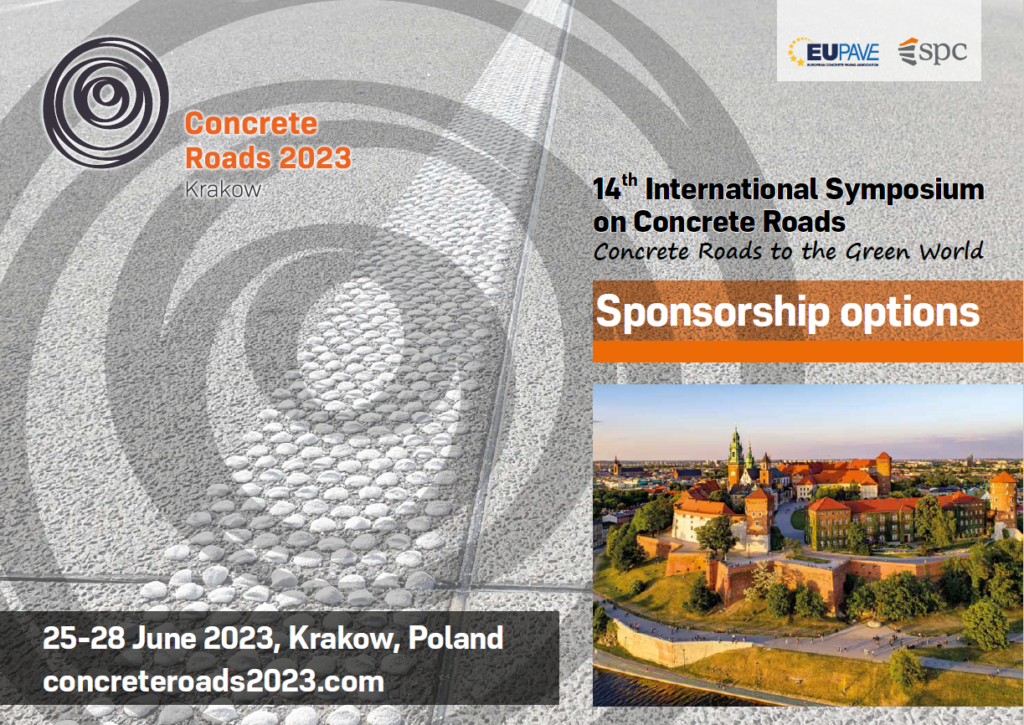
Your organisation will have the possibility to promote its activities during the 14th International Symposium on Concrete Roads. Different forms of sponsorships are detailed in the flyer below.
You can also find out more on the Symposium website: https://concreteroads2023.com/en/sponsors/
Do not hesitate to contact Marek Tobota (marek.tobota@concreteroads2023.com) and Grzegorz Krechowiecki (grzegorz.krechowiecki@concreteroads2023.com) from the Polish Cement Association for further information.
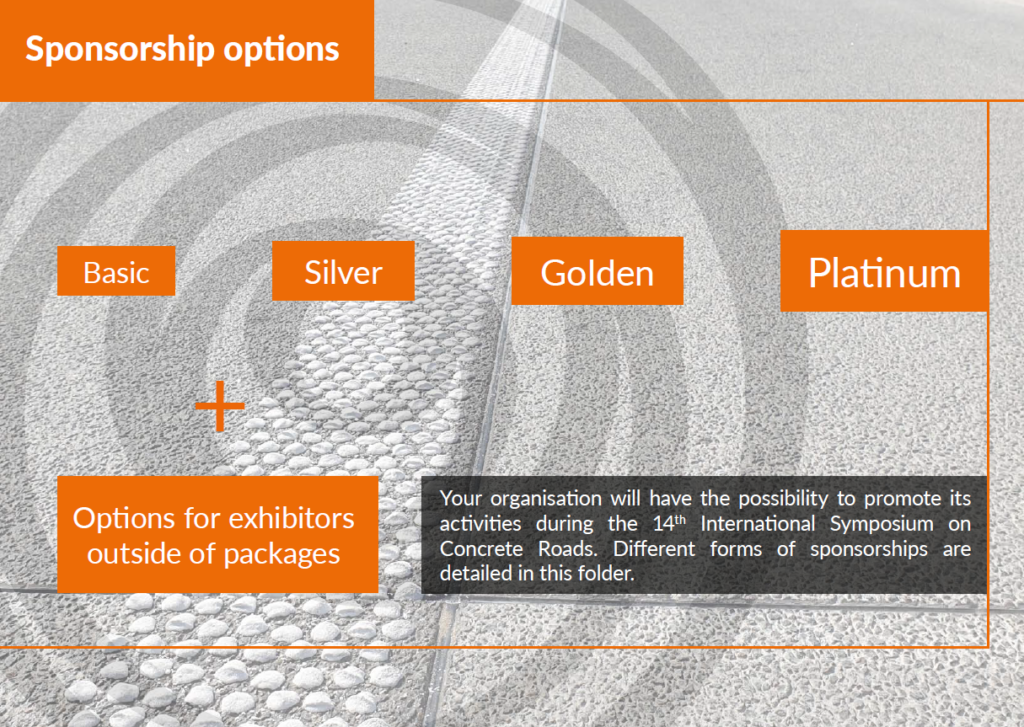
Following the release of our infographic “Concrete Pavements make roads more sustainable”, EUPAVE’s working group on Environmental Strategy has produced fact sheets focusing on its different items.
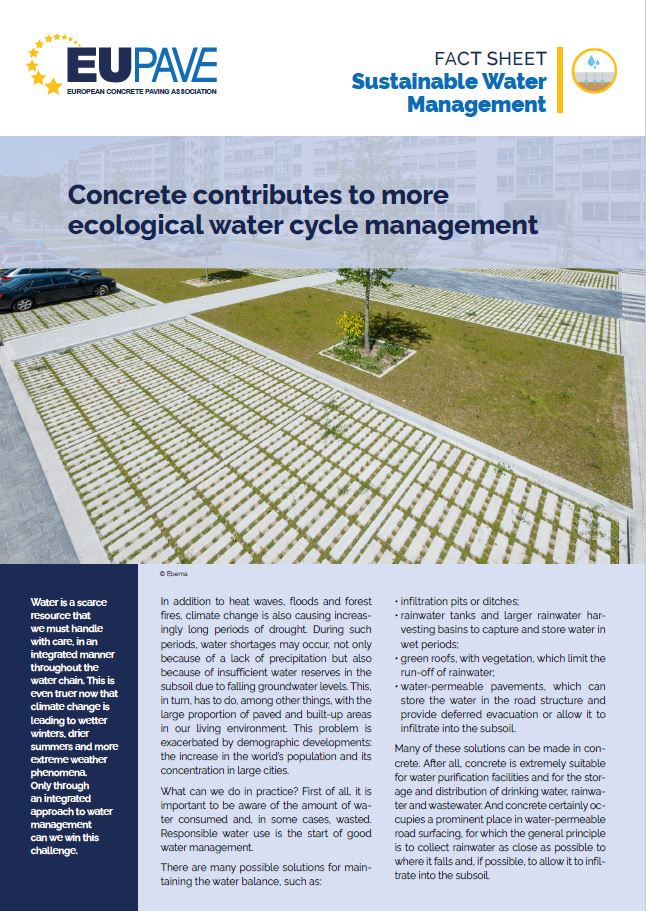
The first document looked deeper into the high albedo effect. The second was focused on fuel consumption. The third on “100% recycling” and the fourth showed how concrete roads are more resilient to climate change and extreme meteorological events. The fifth fact sheet dealt with the long service life of concrete pavements.
The last fact sheet focused on “Sustainable Water Management“.
Water is a scare resource that we must handle with care, in an integrated manner throughout the water chain. This is even truer now that climate change is leading to wetter winters, drier summers and more extreme weather phenomena. Only through an integrated approach to water management can we win this challenge.


